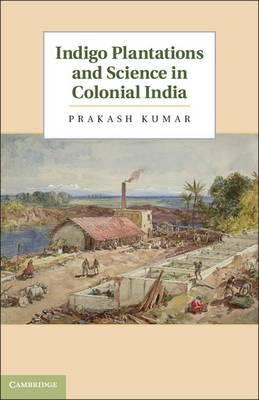
Indigo Plantations and Science in Colonial India
Seiten
2012
Cambridge University Press (Verlag)
978-1-107-02325-3 (ISBN)
Cambridge University Press (Verlag)
978-1-107-02325-3 (ISBN)
Prakash Kumar documents the history of agricultural indigo, exploring the effects of globalisation on a colonial industry in South Asia, from its peasants' traditions in the early modern period through the nineteenth century when indigo culture became more modern and science-based, to its decline after the end of the First World War, when synthetic indigo became more widely used.
Prakash Kumar documents the history of agricultural indigo, exploring the effects of nineteenth-century globalisation on this colonial industry. Charting the indigo culture from the early modern period to the twentieth century, Kumar discusses how knowledge of indigo culture thrived among peasant traditions on the Indian subcontinent in the early modern period and was then developed by Caribbean planters and French naturalists who codified this knowledge into widely disseminated texts. European planters who settled in Bengal with the establishment of British rule in the late eighteenth century drew on this information. From the nineteenth century, indigo culture became more modern, science-based and expert driven, and with the advent of a cheaper, purer synthetic indigo in 1897, indigo science crossed paths with the colonial state's effort to develop a science for agricultural development. Only at the end of the First World War, when the industrial use of synthetic indigo for textile dyeing and printing became almost universal, did the indigo industry's optimism fade away.
Prakash Kumar documents the history of agricultural indigo, exploring the effects of nineteenth-century globalisation on this colonial industry. Charting the indigo culture from the early modern period to the twentieth century, Kumar discusses how knowledge of indigo culture thrived among peasant traditions on the Indian subcontinent in the early modern period and was then developed by Caribbean planters and French naturalists who codified this knowledge into widely disseminated texts. European planters who settled in Bengal with the establishment of British rule in the late eighteenth century drew on this information. From the nineteenth century, indigo culture became more modern, science-based and expert driven, and with the advent of a cheaper, purer synthetic indigo in 1897, indigo science crossed paths with the colonial state's effort to develop a science for agricultural development. Only at the end of the First World War, when the industrial use of synthetic indigo for textile dyeing and printing became almost universal, did the indigo industry's optimism fade away.
Prakash Kumar is Assistant Professor of South Asian History at Colorado State University.
Introduction: the odyssey of indigo; 1. The world of indigo plantations: diasporas and knowledge; 2. The course of colonial modernity: negotiating the landscape in Bengal; 3. Colony and the external arena: seeking validation in the market; 4. Local science: agricultural institutions in the age of nationalism; 5. The last stand in science and rationalization; 6. A lasting definition of improvement in the era of world war.
| Zusatzinfo | 7 Tables, unspecified; 2 Maps; 13 Halftones, unspecified |
|---|---|
| Verlagsort | Cambridge |
| Sprache | englisch |
| Maße | 163 x 235 mm |
| Gewicht | 630 g |
| Themenwelt | Geisteswissenschaften ► Geschichte ► Regional- / Ländergeschichte |
| Geschichte ► Teilgebiete der Geschichte ► Technikgeschichte | |
| Geschichte ► Teilgebiete der Geschichte ► Wirtschaftsgeschichte | |
| Naturwissenschaften | |
| Weitere Fachgebiete ► Land- / Forstwirtschaft / Fischerei | |
| ISBN-10 | 1-107-02325-4 / 1107023254 |
| ISBN-13 | 978-1-107-02325-3 / 9781107023253 |
| Zustand | Neuware |
| Haben Sie eine Frage zum Produkt? |
Mehr entdecken
aus dem Bereich
aus dem Bereich
Buch | Softcover (2024)
Lehmanns Media (Verlag)
19,95 €
Digitalisierung neu denken für eine gerechte Gesellschaft
Buch | Hardcover (2023)
Quadriga (Verlag)
20,00 €
Vom Perceptron zum Deep Learning
Buch | Softcover (2022)
Springer Vieweg (Verlag)
19,99 €


